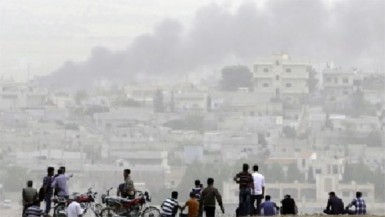MURSITPINAR, Turkey/BEIRUT (Reuters) – Kurdish forces defending Kobani urged a US-led coalition to escalate air strikes on Islamic State fighters who tightened their grip on the Syrian town at the border with Turkey yesterday.

A group that monitors the Syrian civil war said the Kurdish forces faced inevitable defeat in Kobani if Turkey did not open its border to let through arms – something Ankara has so far appeared reluctant to do.
The U.S.-led coalition escalated air strikes on Islamic State in and around Kobani, also known as Ayn al-Arab, some four days ago. The main Kurdish armed group, the YPG, said in a statement the air strikes had inflicted heavy losses on Islamic State, but had been less effective in the last two days.
A Kurdish military official, speaking to Reuters from Kobani, said street-to-street fighting was making it harder for the warplanes to target Islamic State positions.
“We have a problem, which is the war between houses,” said Esmat Al-Sheikh, head of the Kobani defence council.
“The air strikes are benefiting us, but Islamic State is bringing tanks and artillery from the east. We didn’t see them with tanks, but yesterday we saw T-57 tanks,” he added.
While Islamic State has been able to reinforce its fighters, the Kurds have not. Islamic State has besieged the town to the east, south and west, meaning the Kurds’ only possible supply route is the Turkish border to the north.
The UN envoy to Syria on Friday called on Turkey to help prevent a slaughter in Kobani, asking it to let “volunteers” cross the frontier so they can reinforce the Kurdish forces defending the town that lies within sight of Turkish territory.
Turkey has yet to respond to the remarks by Staffan de Mistura, who said he feared a repeat of the 1995 Srebrenica massacre in Bosnia when thousands died. Kurdish leaders in Syria have asked Ankara to establish a corridor through Turkey to allow aid and military supplies to reach Kobani.
A senior Kurdish militant has threatened Turkey with a new Kurdish revolt if it sticks with its current policy of non-intervention in the battle for the Syrian town of Kobani.
“(Islamic State) is getting supplies and men, while Turkey is preventing Kobani from getting ammunition. Even with the resistance, if things stay like this, the Kurdish forces will be like a car without fuel,” said Rami Abdelrahman, who runs the Syrian Observatory for Human Rights, an organisation that monitors the conflict in Syria through sources on the ground.
Turkey has been reluctant to help the Kurds defending Kobani, one of three areas of northern Syria where Kurds have established self-rule since the Syrian civil war began in 2011. The main Syrian Kurdish group has close ties to the PKK – which waged a militant campaign for Kurdish rights in Turkey and is listed as a terrorist group by Turkey and its Western allies.
Tall plumes of smoke were seen rising from Kobani on Saturday and the sound of gunfire was close to constant as battles raged into the afternoon, a Reuters journalist observing from the Turkish side of the frontier said.
After sunset, the sounds of gunfire and shelling continued. Red tracer gunfire lit up the sky in the eastern sector of the town, much of which has fallen to Islamic State. Battles also raged at the southern and western edges of the town.
A Kurdish military official in the Syrian city of Qamishli, another area under Kurdish control, said thousands of fighters stood ready to go to Kobani were Turkey to open a corridor.
But Ghaliya Naamat, the official, said the fighters in Kobani were mainly in need of better weaponry. “Medium-range weapons is what is lacking,” she told Reuters by telephone.
“According to the news and the information in Kobani, there is no shortage in numbers. The shortage is in ammunition.”
The symbolism of US-led air strikes failing to stop Islamic State militants from overrunning Kobani could provide an early setback to US President Barack Obama’s three-week-old air campaign against Islamic State in Syria.
The campaign is part of a US strategy to degrade and destroy the group that has seized large areas of Syria and Iraq, threatening to redraw the borders of the modern Middle East according to its ultra-strict vision of Islam.
If Islamic State seizes full control of the town – which US officials acknowledge is possible in coming days – it would be able to boast that it has withstood American air power. The US-led coalition has launched 50 strikes against militant positions around the town, most of those in the last four days.
The US military conducted six airstrikes against Islamic State militants near the besieged Syrian city of Kobani on Friday and Saturday, US Central Command said.










